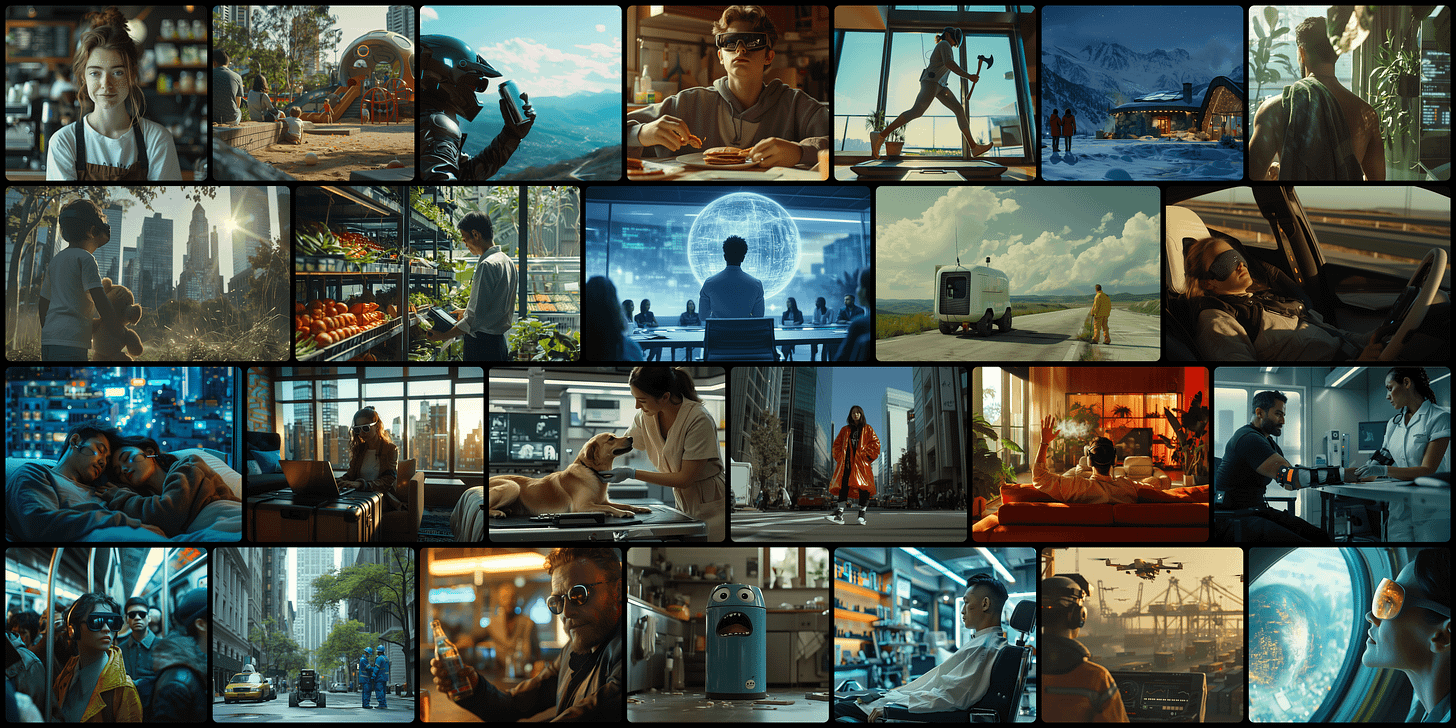Have you tried grit grinding?
The career counsellor swipes through the glowing lattice of her experience topology, spinning nodes and connections with the casual precision of someone adjusting their glasses.
- Your only problem is that you're still trying to climb all the mountains at once. Have you tried grit grinding?
- Not really. It sounds like a cliché written for a motivational poster.
- You see, talent may be limited, but dedicated effort is available to everyone. In the age of AI, specialised persistence overcomes generalised competence.
The spatial map of her experience floats between them. She looks around, unconvinced as the counsellor continues.
- If you’re persistent enough, finding interesting problems to work on shouldn’t be a problem. Every second, new requests ping across the expertverse, where corporate AIs quietly hunt down obscure datasets, and governments mine insights to sharpen policy algorithms. You can almost hear the hum of ideas being processed. Who could have imagined that software would plateau, and data would become the new gold rush?
- Not me.
- Me neither, but this is how we started. Fast-forward a few years, and AIs of all shapes and sizes chase new ideas or obscure training data on the expertverse. We create new opportunities as quickly as the old ones are automated. Our constellation of contributors grinds tiny niches to fill them with knowledge. This know-how is then used to train AI, so the expertise previously considered ultra-niche becomes a part of the average AI output for everyone.
- And what if my skillset is more about breadth than depth? I’m afraid grinding myself into an irreplaceable asset may be overwhelming.
- A renaissance grinder, huh? Great! Then your potential is in blending exciting combinations no one has thought of before.
- And if I'm not sure about the value of my skills?
- Like most people, you can start as a data forager.
Raised eyebrows prompt more explanation.
- What's that?
- Looking for stuff that never made it online. Who knows? Your work could help revive forgotten crafts or turn ancient knowledge into fresh training data.
- This sounds interesting. And what about burnout? I won’t believe there is no psychological impact of constantly refining an ever narrowing skill set?
- That’s the beauty of the whole situation. Most contributors work across all tracks. Everyone knows something. Start small. Rack up career credits and build momentum. Join a team. Work on bigger problems. Join bigger teams. Get a higher clearance. Work on complex problems. Build confidence to pick something new. Think of it as legacy careers, compressed into weeks instead of decades. Less waiting, more pivoting.
- I still feel I have no special talents to offer.
- Nonsense. Whatever you’re interested in trains the machine. Artificial intelligence will eventually turn all of us into teachers, teaching AIs how their intelligence can be less artificial. So, there is a track for everyone.
- I’m curious what we’ll all do when we finally teach the machines how to run our world.
- Whatever it may be, I’m pretty sure it will be more fulfilling than breaking one’s back in a mine.
- Ha. What's better than a convincing perspective?
- Don’t expect the world to ever run out of problems. Building machines to solve one problem creates new problems for new machines to solve. By reducing the demand for average to zero, AI will only make this cycle repeat faster than ever before. For now, the only thing that can push the boundaries of AI further is human excellence.
- Hmm. Technology may be just how the universe keeps us from getting bored.
- You sound like a very curious person. When everything is emerging, the broader your curiosity, the stronger your progress. Hmm. This is exactly where you should start.
- And where is that?
- Curiosity training.
- Can you train that?
- It’s only up to you to figure it out. Ok. You’re all set.
They nod beaming confirmations between their devices.
- Thanks. I can’t wait to get started.
- Welcome to the post-average economy. Welcome to the expertverse.
Hello Practical Futurists,
Welcome back from the future, where expertise is still the ultimate renewable resource, but the traditional career ladder was replaced by grit grinding in the expertverse.
Hit the "Like" button at the top or bottom of this page to help others build a future-ready mindset.Great leaders don't just think about the future. They experience it.
Like elite athletes who vividly visualise their performance, exceptional leaders build detailed mental pictures of possible futures to inform better decisions today.
Each week, our imagination workouts combine futures thinking and practical sci-fi, helping you build a personal library of future memories. These vivid mental scenarios transform abstract possibilities into clear reference points, sharpening your strategic instincts and enhancing your readiness for the age of AI.
Ready to expand your imagination? Start here:
Now, let's make this future personal.
We'll connect the ideas from the story directly to your life, turning abstract possibilities into practical memories you can use to navigate tomorrow's challenges confidently.
Personal life reflection prompts
1. If you could spend a month learning something completely outside your current field of expertise, which two topics would spark your curiosity? What are the biggest barriers currently preventing you from such explorations?2. What "offline" knowledge, traditions, or practices from your family, community, or cultural background have never been properly documented or shared? How might preserving these contribute to collective knowledge?3. Think back to the day you realised your hobby had become valuable training data for AI systems: - How did you first discover that your niche interest was in demand? - What felt strange about monetising the knowledge you'd always given away freely? - How did this change your relationship with your own expertise? - What moment made you understand that everyone had something valuable machines could learn?
4. Imagine condensing what traditionally takes decades of career development into weeks of intensive focus. Which life skill or personal project would you accelerate if time-to-mastery could be dramatically shortened by AI?5. Try ot recall the first time you hired a curiosity trainer to help expand your intellectual range: - What specific mental exercises did they assign to stretch your thinking patterns? - Which unexpected subject area became your most engaging discovery? - How did friends and family react when you started exploring wildly different topics? - What breakthrough moment made you realise your curiosity had genuinely expanded?
6. Reflect on a recent personal improvement or life change you have made. What new challenges or complications did solving that original problem create? How do you view this cycle of problem-solving generating new problems?7. In which areas of your personal life do you consistently perform above average, and where do you accept mediocrity? What would change if "average" performance became obsolete in all areas?Fantastic work!
You're building an impressive collection of future-focused insights. Now, let's supercharge your thinking by adding powerful professional leadership moments.
How will you guide your team or organisation through the future you've just envisioned? Let's create memorable leadership experiences together.
Professional life reflection prompts
1. If you had to teach an AI system to replicate your decision-making processes, what two aspects would be the most difficult to convey?2. Think back to the first time you trained an AI system using your professional expertise: - Which aspects of your job knowledge were surprisingly difficult to articulate? - How did teaching machines change your understanding of your own skills? - What parts of your work did you realise were more creative than you'd thought? - Which moment made you see that human-AI collaboration was reshaping your role?
3. In your current role, are you more valuable as a deep specialist or as a connector across disciplines? How might the increasing polarisation between AI-replaceable generalists and irreplaceable specialists affect your career strategy?4. Try to recall your first experience working with the expertverse: - What was your initial niche area of contribution? - How did you navigate the rating and verification systems for your expertise? - What surprised you most about the diversity of problems needing solutions? - Which moment made you realise that hyper-specialisation was becoming the new normal?
5. What proprietary knowledge, processes, or institutional memory within your organisation has never been properly documented or could be lost when key people leave? In what two ways could capturing this dark know-how increase competitive advantage?6. If AI eliminates the market for "good enough" performance in your profession, what would you need to do to consistently operate at the level of excellence? How would you structure your work to ensure you're always pushing the boundaries rather than meeting existing standards?7. Think back to the first quarter your organisation shifted from hiring generalists to exclusively seeking post-average specialists: - How did interview processes change to identify true expertise over broad competence? - What happened to colleagues who couldn't demonstrate clear specialisation? - How did team dynamics evolve when everyone brought deep, narrow expertise? - Which moment showed you that being "good at everything" was no longer an asset?
8. What two or more completely unrelated fields or industries could you credibly bridge based on your unique background and interests? How might such hybrid expertise become increasingly valuable as AI handles routine single-domain tasks?You did amazing! Excellent work!
Today's insights are valuable additions to your growing library of future experiences.
Thank you for expanding your imagination with us. Leaders with bold ideas move our world forward.
Think bright, and see you soon.
Pawel Halicki
Add your dose of Practical Futurism to your LinkedIn scroll
Connect with even more future-focused professionals.
Do you want stories like this in your inbox?
Join strategic imagination workouts that inspire change-makers in market-leading organisations, including Visa, Deloitte, Barclays, UEFA, Nielsen, Morgan Stanley, and many more.







